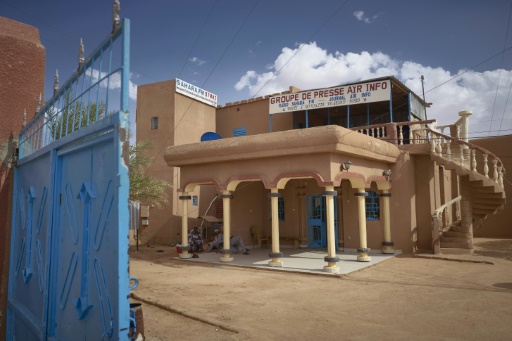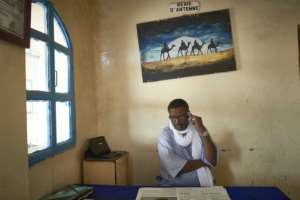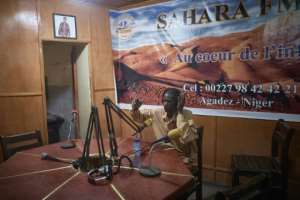
[ad_1]
From the outside, it doesn’t look like much: a two-story building with a logo on the dusty streets of Agadez in northern Niger.
But a lot has happened inside the building of Air Info – an ambitious medium that has broken exclusives in the Sahara Desert.
A vast, sparsely populated region, northern Niger is plagued by drug and arms trafficking, migration and violence from armed groups.
In 2002, Ibrahim Manzo Diallo, a young teacher stationed in the troubled region, was struck by the lack of media coverage.
There was no media providing “news from the Far North,” he told AFP.
Using a newly installed printing press in Agadez, Diallo started a monthly publication, funding it from his meager teaching salary.
Today, Air Info has 13 full-time employees and in addition to the newspaper – whose publication rate varies – has a popular website and Sahara FM, one of Agadez’s main radio stations, acquired in 2013.
For those who need information on northern Niger, the crossroads between North Africa and sub-Saharan Africa, Air Info is now the essential source.
“We don’t go looking for scoops anymore, they come to us,” Diallo said with a smile.
Threats and prison
One of Air Info’s exclusives was video footage released last year of two Italians held hostage by al-Qaeda jihadists, the first evidence they were alive after years of detention.
An Italian TV station offered to buy the footage, but Diallo refused.
As always, everyone wanted to know his sources.
 Air Info founder Ibrahim Manzo Diallo now heads an organization with 13 full-time employees and a radio station. By Michèle Cattani (AFP)
Air Info founder Ibrahim Manzo Diallo now heads an organization with 13 full-time employees and a radio station. By Michèle Cattani (AFP) “The only thing that protects us is honesty and seriousness,” he said.
“Our sources know that we will never reveal who is talking to us.”
An early scoop intervened during the kidnapping of several French citizens in 2010.
Air Info was “one of the very first” to get eyewitnesses talking, Diallo says, adding that the story “has helped establish our credibility.”
But behind the man with the broad smile, dressed in a boubou and eating braised mutton on the windy terrace of his organization’s headquarters, there is a journalist caught between the national security forces and the jihadist expansion.
He said he “gets calls from everywhere” from “people willing to give us money to keep the news quiet.”
He posted the video about the Italian hostage without batting an eyelid. No one knows who gave it to him.
But the freedom to publish in a predictable way comes at a price: threats and sometimes jail time.
In 2007, Air Info was forced to close for three months and Diallo was jailed for four months after being accused of links to an ethnic Tuareg rebellion that was raging at the time.
Diallo said it was because earlier that year Air Info published an article under the headline “Drama in Tizirzet” about the discovery of “civilians beheaded by those who were supposed to protect them”.
“I was sure it was going to cost me dearly,” he said.
But despite his time in jail – and the fact that all copies of the newspaper were bought suspiciously after just a few hours on sale – he said it was still the scoop he was most proud of.
“Hello Agadez! ”
Upstairs under the newspaper’s editorial room, the sounds of Sahara FM resonate as the presenters take turns in the unique studio.
 Sahara FM radio hosts provide public service information to their many listeners. By Michèle Cattani (AFP)
Sahara FM radio hosts provide public service information to their many listeners. By Michèle Cattani (AFP) The programming is lighter than the newspaper, favoring practical information for the inhabitants.
For example, mayors call the station so it can warn people living near rivers of an upcoming flood, Diallo says.
Every morning, Salah Safo presents his “Hello Agadez! Hausa-language program for 350,000 listeners, according to station figures.
“People are calling to sign their friends, it’s a very popular show,” Safo said.
Once Safo is complete, the next host takes over in the Tuareg Tamashek language, as the station moves through the many languages of the region.
Air Info’s meager finances have been hit by the Covid-19 pandemic but Diallo is looking to the future.
“We now think we’re on TV,” he said.
Source link